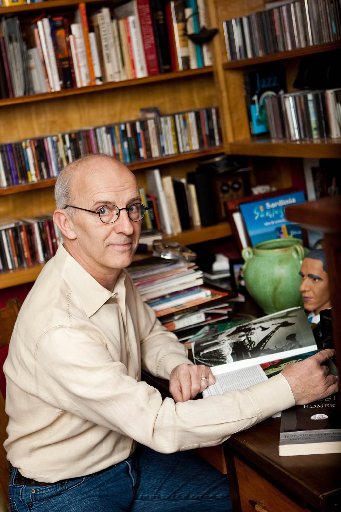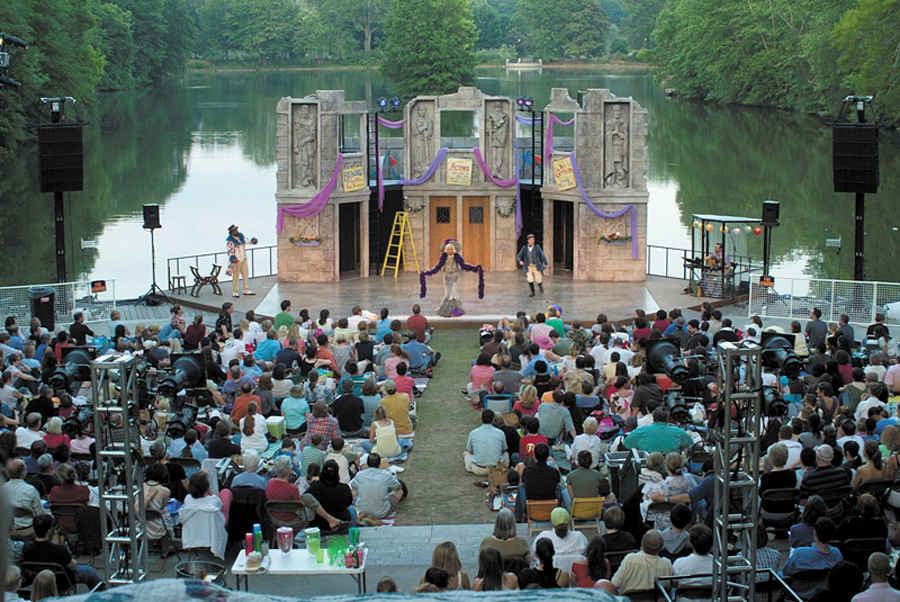ATLANTA: It’s a tragedy on par with one of Shakespeare’s, or at least it feels that way. Yesterday, Oct. 8, the long-running Georgia Shakespeare announced that it will close after 29 years. The company also laid off its remaining staff of nine and canceled its holiday production of A Holiday Panto. The reason cited was financial—specifically, the theatre’s long-standing debt of $343,000 and the inability to come up with the funds to eliminate it.

Speaking over the phone, co-founder and producing artistic director Richard Garner sounded somber, yet accepting of his theatre’s fate. “We’ve been wrestling with it, seeing it coming, trying to make it not come,” he says. “There’s something about when you finally formally announce—it hits you again.”
As one of only two LORT theatres in Georgia (the other one is the nearby Alliance Theater), Georgia Shakespeare occupied a particular niche in the close-knit Atlanta theatre community. Founded in 1986 by Lane Anderson, Robert Watson and Garner as a summer festival, the theatre specialized in contemporary interpretations of Shakespeare and other classics, while also producing the occasional new take on a classic, such as Sarah Ruhl’s Eurydice.
“Not much armor but a lot of Armani,” is how Garner described his company’s aesthetic. “The mission here was to bring the stories to our audience today rather than bring the audience back to the story. We adapted several Shakespeare plays into modern musicals. We took a unique approach to the classics; no one else does that [here].”
In a sign of the impending trouble, at the beginning of September the company canceled its October production of Henry V due to lack of funds. The theatre set a fundraising goal of $750,000 to cover not only the show but also to help retire its debt, replenish operating funds and build a small reserve.
Garner says that one fundraising challenge is that donors were more inclined to give to capital campaigns than to day-to-day operations. During its season this past summer, Georgia Shakespeare raised more than $200,000 (the first phase of a $1 million capital campaign) to pay for a redo of the picnic grounds and new sound equipment at its home at Oglethorpe University’s Conant Performing Arts Center. But finding funds to help dig the theatre out of debt was more difficult.
“I said the worst thing that can happen is we just eliminate the debt and start at zero—we needed to get healthy,” says Garner. “We had several conversations, a lot of moral support, but debt is something that people don’t like to fund. For that $750,000, a lot of people said, ‘If you get close to it, come to me and I will help you finish the campaign.’ But no one gave a lead gift.”
This news comes at the tail end of a number of production successes at Georgia Shakespeare this past summer. Its production of One Man, Two Guvnors played to sold-out houses, and As You Like It set a single-day attendance record of 1,642 attendees.

And even though in four out of the past five years, the balance sheet at the theatre had been in the black, and past fundraising campaigns were successful (such as the high-profile 2011 Save Georgia Shakespeare campaign, which raised more than $500,000), the debt remained. The theatre’s budget stood at $1.5 million.
Garner points out that this was not a case of errant spending or poor money management; Georgia Shakespeare never exceeded its expense budget. The problem was revenue. Ticket sales usually covered only half of a show’s cost. And since the recession, corporate support has dried up, while national and state funding steeply declined. At its peak in 2002, the Georgia Council for the Arts gave out $4.5 million in grants statewide. For fiscal year 2015, that number was $750,000 (Georgia is currently ranked 50th in the country on its per capita spending for the arts).
Those factors, plus the slow decline in ticket sales, created a perfect storm. “Along the way, everybody’s saying we have to find a new operating model,” says Garner. “We’ve made adjustments in programming and staff sizing. Two seasons ago, we cut way back on our programming. But that’s the wrong thing to do, because people get pissed off and want more work! It doesn’t generate more individual giving or foundation giving. It’s just a big, complicated mix of factors. We certainly made an effort to find that magical elixir.”
The closure of a LORT theatre begs the question: What does it mean for other large theatres, especially ones with a focus on Shakespeare? To Garner, Georgia Shakespeare’s audience decline is reflective of a national trend in the field.
“Ticket sales nationally are on a slight glide down for everybody,” he says. “I have wondered if everything has a life cycle—if this is the end of a life cycle of a company…. We made a decision way back to be LORT and to pay LORT salaries for everybody, so the work we do is bigger of scale. Maybe it’s a reflection of work at that scale.”
“If you have a theatre company you love, buy tickets to see their show. Support them.”
That doesn’t mean that smaller theatres are immune to such an outcome. The past few years have seen the closure of Theater of the Stars in 2013, and Theatre in the Square in 2012. “I worry about our other peers in town,” says Garner. “Let this be a message to everybody: If you have a theatre company you love, buy tickets to see their show. Support them.”
Georgia Shakespeare has set up a ticket exchange for its cancelled productions of Henry V and A Holiday Panto; anyone who purchased tickets for either show can exchange them for tickets to productions at other Atlanta theatres around the same time, such as Actor’s Express or Theatrical Outfit.
For Garner’s part, this news, coming just one year short of the company’s 30th anniversary season, is especially tough. “I had really big plans for our 30th season, with everything carefully chosen to feature our company of associates and ensemble and start a search for my replacement. But alas, it’s not to be.”
That doesn’t mean that Garner hasn’t noticed the outpouring of sympathy and support, in person and on Facebook. To him, it shows how much of an impact his theatre has had on the Atlanta community.
“Part of our legacy is that we have been committed to local artists and developing them at the theatre,” he says, referring to Georgia Shakespeare’s company of associate artists, many of whom returned to the theatre year after year. “We’ve been around long enough that the guy who plays Hamlet started 15 years ago here as an intern.
“Our legacy is that that group of associate artists that we’ve had over the years—actors, directors, technicians—are making a living in this community because we’ve committed to them early on. Our legacy will live on through the work that they continue to do, so that’s heartening.”


